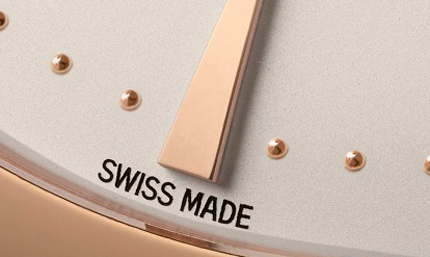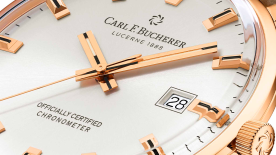The Swiss Made issue is a balancing act that involves safeguarding the “Made in Switzerland” aspect yet without raising the price of ownership to a prohibitive level.
Today’s world is a global one. Volkswagen cars are being made in Mexico. Apple iPhones are produced in China. 60% of Triumph motorcycles, an iconic British mark, are made in Thailand, while Royal Enfield, another famous British motorcycle brand, is now entirely produced in India.
Does it really matter where products are produced today? In watches, I think it does.
Swiss Made still means something to the end consumer and it has to be safeguarded. Watches that are made in Switzerland are highly valued by customers and Switzerland is seen as the home of fine watchmaking. A Swiss Made watch is a hallmark of quality, no matter the retail price.
Right now, to use the Swiss Made designation, there are a number of criteria:
1. The movement has to be Swiss (meaning that it has been assembled and inspected in Switzerland, and at least 50% of the value of the movement components has to come from Switzerland)
2. The movement has to be cased up in Switzerland
3. The final inspection has to be done in Switzerland.

There are companies within the watch industry pushing for the Swiss Made label to be more restrictive than it currently is. For example, they want to increase the percentage of movement components, guaranteeing that a greater majority of the work is done in Switzerland.
I understand the reasoning behind this, but I’m not sure it’s the right move. While Swiss Made is important, a more restrictive standard would automatically result in higher-priced watches, and as a result, Swiss watches, especially entry-level timepieces, might no longer be competitive on the world stage. As a result, the Swiss Made label might be transformed into a detriment to the watch industry in Switzerland.
There are a few brands that no longer use the Swiss Made label, preferring to use terms such as “Fabriqué en Suisse” or something similar. Other brands put nothing at all on their dials indicating the country of origin.
The watch industry must continue emphasizing the value of Swiss origin of the movements and the majority of the parts. However, to remain competitive in an ever more challenging business environment, I don’t think it’s a good idea to make manufacturers buy more expensive parts that can be sourced from other areas of the world. Sure, keep the majority of the important work and competence in Switzerland, but make sure you don’t drive the volume players out of the watch business.
Today, many people around the world aspire to one day owning a Swiss timepiece. We in the watch industry have to safeguard this dream and protect the “Swissness” and the exclusivity of watches made in Switzerland. At the same time, however, we have to make sure the dream of owning a Swiss timepiece is affordable. Not many people can jump in and buy a Patek Philippe – an affordable entry-level Hamilton or Baume & Mercier watch is often a ticket to a lifetime of fine watch ownership and collecting.
The Swiss Made issue is a balancing act that involves safeguarding the “Made in Switzerland” aspect, yet without raising the price of ownership to a prohibitive level.
Does it really matter where products are produced today? In watches, I think it does.
Swiss Made still means something to the end consumer and it has to be safeguarded. Watches that are made in Switzerland are highly valued by customers and Switzerland is seen as the home of fine watchmaking. A Swiss Made watch is a hallmark of quality, no matter the retail price.
Right now, to use the Swiss Made designation, there are a number of criteria:
1. The movement has to be Swiss (meaning that it has been assembled and inspected in Switzerland, and at least 50% of the value of the movement components has to come from Switzerland)
2. The movement has to be cased up in Switzerland
3. The final inspection has to be done in Switzerland.

There are companies within the watch industry pushing for the Swiss Made label to be more restrictive than it currently is. For example, they want to increase the percentage of movement components, guaranteeing that a greater majority of the work is done in Switzerland.
I understand the reasoning behind this, but I’m not sure it’s the right move. While Swiss Made is important, a more restrictive standard would automatically result in higher-priced watches, and as a result, Swiss watches, especially entry-level timepieces, might no longer be competitive on the world stage. As a result, the Swiss Made label might be transformed into a detriment to the watch industry in Switzerland.
There are a few brands that no longer use the Swiss Made label, preferring to use terms such as “Fabriqué en Suisse” or something similar. Other brands put nothing at all on their dials indicating the country of origin.
The watch industry must continue emphasizing the value of Swiss origin of the movements and the majority of the parts. However, to remain competitive in an ever more challenging business environment, I don’t think it’s a good idea to make manufacturers buy more expensive parts that can be sourced from other areas of the world. Sure, keep the majority of the important work and competence in Switzerland, but make sure you don’t drive the volume players out of the watch business.
Today, many people around the world aspire to one day owning a Swiss timepiece. We in the watch industry have to safeguard this dream and protect the “Swissness” and the exclusivity of watches made in Switzerland. At the same time, however, we have to make sure the dream of owning a Swiss timepiece is affordable. Not many people can jump in and buy a Patek Philippe – an affordable entry-level Hamilton or Baume & Mercier watch is often a ticket to a lifetime of fine watch ownership and collecting.
The Swiss Made issue is a balancing act that involves safeguarding the “Made in Switzerland” aspect, yet without raising the price of ownership to a prohibitive level.




